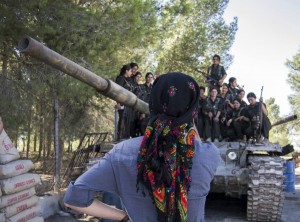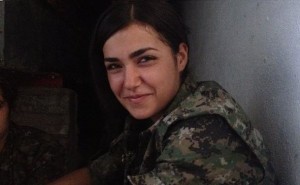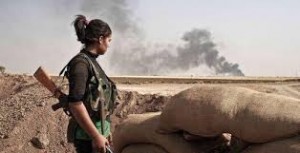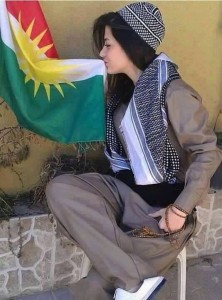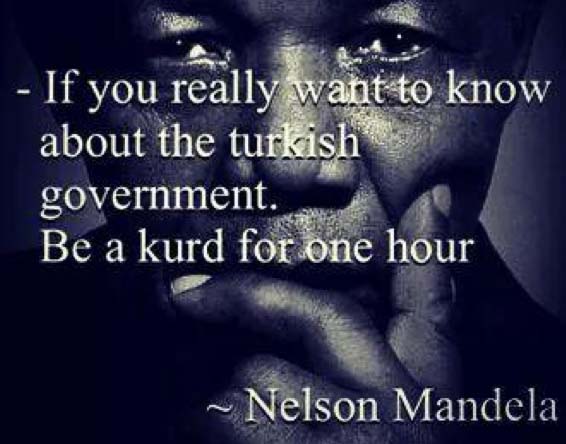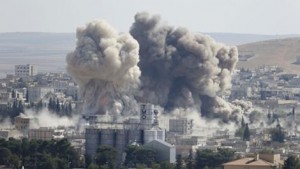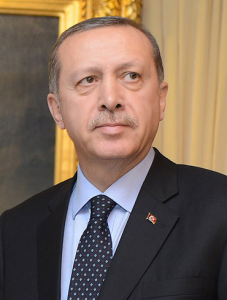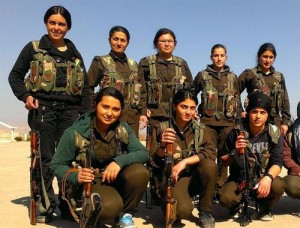Turning Turkey into the next Syria has already begun – and the US could play a pivotal role in stopping it
Written by Carol Benedict, Independent Journalist
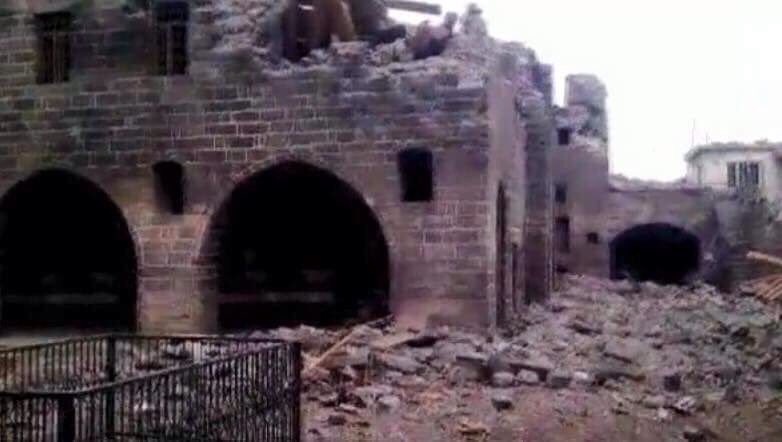
Historic Armenian church in the Sur district of Diyarbakir destroyed by Turkish army February 21, 2016. Image via Twitter.
Continued reports coming out of Turkey indicate a dire situation, worsening daily for the civilian population in the southeast region that is predominantly Kurdish. American media still refuse to cover this crisis, leaving most Americans clueless of not only what is wrong in Turkey, but why their own government is now in a precarious situation which has distasteful outcomes regardless the decisions made.
Because the US has a track record of basing policy decisions on oil and strategic military interests, it remains to be seen if they can take the moral high ground in the war against terror, or if they will buckle to the whims of a megalomanic bent on the destruction of the civilian Kurdish population within his own country.
President Erdogan and the Turkish government have taken revenge on the Kurds for their recent gains in the country’s elections in 2015. After winning a representative portion in parliament during the June elections, Erdogan called a snap election in November to take back any gains the Kurds had achieved. Since that time, efforts to decrease the support of his political opponents has resulted in his AKP government waging a literal ground war and extermination campaign against the HDP.
In the middle of last August, the government enacted curfews and sieges in the Kurdish cities, using the discarded peace talks and escalating violence with the PKK as an excuse. They set about destroying Kurdish homes, cemeteries, schools, villages, historical landmarks and art from ancient cultures to dehumanize the Kurds. President Erdogan has stated that this campaign will not end until south east Turkey has been “cleansed” of all “terrorists.”
Official reports from the Turkish press claim all those killed in the SE region of Turkey since August are terrorists. They make this claim by declaring the political party of the Kurds, the HDP, to be a terrorist group because of the simple fact that there are Kurds in the HDP and the PKK is also comprised of Kurds. In their minds, that makes anything Kurdish associated with terror, a just enough reason to massacre all Kurds, effectively beginning a genocide in the SE of Turkey.
The following press release was written by Hişyar Özsoy, Vice co-Chair for Foreign Affairs, Peoples’ Democratic Party in Ankara.
Don’t let tomorrow be too late for Sur!
The indefinite, round-the-clock curfews that the AKP government has declared in Turkey’s Kurdish provinces since August 16, 2015 continue to deepen the emergency situation that undermines basic human rights and freedoms in the region, including the right to live and personal safety. As of today, curfews have been effective in seven provinces and twenty counties for a total of 395 days. This curfew policy directly and clearly violates imperative provisions of the Constitution of the Republic of Turkey as well as basic principles of international humanitarian law, first and foremost the provisions of Geneva Convention for the protection of civilians in war and conflict zones. The last and most destructive example of systematic violence and massacre threats under the curfew rule occurred in the town of Cizre, Şırnak province, before the eyes of indifferent Turkish and international publics: at least 165 civilians who had taken refuge in the basements of residential buildings amidst military operations were bombarded to death by Turkish security forces.
Whereas the AKP government continues to absolve itself of the responsibility to account for the basics of the civilian massacre in Cizre beyond the cliché of “fighting terror,” we are, once again, terrified by the news that most recently came from Sur district of Diyarbakır, which has been under curfew for the last 78 days, since December 11, 2015. According to local sources and the press, as of February 18th, around 200 people, including children and injured individuals, remain trapped in the basements of residential buildings in Sur district, where armed clashes have been taking place. For the last two days our party officials and members of the parliament have been trying to communicate with the government representatives, demanding official investigation of these claims and the opening of a safe corridor for the transfer of trapped civilians. Yet, all our efforts and demands remain unanswered. We are extremely concerned about the possibility that the massacre in Cizre may be repeated in Sur.
Under these circumstances, we are further concerned about the ongoing silence of the international public against the violence and massacres in Kurdish cities. As the military attacks against the trapped civilians were going on in Cizre, we had told the international public that their silence and indifference was bolstering the AKP government and its security forces in their unlawful and inhumane practices in Kurdish cities. Had the international public raised a powerful voice for the protection of the lives and safety of the trapped civilians in Cizre, perhaps we would not have had hundreds of dead bodies retrieved from beneath the ruins of Cizre today.
Now at the wake of a similar possible tragedy to take place in the Sur district, we are appealing to the international community once again. We are calling on all international institutions, humanitarian organizations and activists to take urgent responsibility and approach the Turkish government without any delay for the termination of curfews and state violence in Kurdish cities, and particularly for the protection of the lives of the civilians that are trapped inside the basements in Sur. Don’t let tomorrow be too late for Sur!
Meanwhile, in the REAL war on terror…
The Kurds in Iraq have an established military force, called the peshmerga, which in Kurdish loosely translates to mean “He who confronts death.” In Iraq, it was the peshmerga forces, working with the US coalition, that were able to repel ISIS in the northern territory of Iraq. It was the peshmerga, together with other Kurdish forces including the PKK, that were able to rescue the Yazidi population held captive on Mount Sinjar in 2014.
In northern Syria, the most successful and fierce ally in the Syrian war against Daesh (ISIS) has been the YPG/YPJ forces. The YPG (men) and YPJ (women) are Kurdish forces in Rojava, the Kurdish name for northern Syria. Their ongoing campaign against Daesh has taken back cities and territory the terrorist group had occupied. It was a direct result of their actions that the city of Kobane did not fall to Daesh a little more than a year ago. They are also helping refugees fleeing the area around Aleppo, where the war in Syria has worsened since Russia has joined the air campaign of bombing and shelling.
As these Kurdish forces continue to win against ISIS and work with the US coalition forces, Turkey has begun shelling and bombarding them. The AKP recently labeled the YPG/YPJ forces as terrorist organizations to justify their actions and President Erdogan has challenged the US to pick a side in this particular battle.
A History NOT worth repeating
The US government has befriended – and then de-friended – the Kurds in 3 past interactions.
Writer Rick Noack in an August, 2014 article in The Washington Post, points out the US history of betrayal regarding the Kurds;
1972/1973 – Iraq’s Ba’ath party has become a threat in the eyes of the U.S. government. President Nixon and Iran’s shah begin to fund the Kurdish pesh merga guerrillas and support their claims for autonomy. In 1972, Saddam Hussein had signed a “Friendship and Cooperation” treaty with the USSR.
1975 – After the surprising Algiers Agreement between Iran and Iraq is reached, the U.S. stops its support for the Kurdish rebels which causes the fragmentation of the opposition and an increased vulnerability to Saddam Hussein’s renewed attacks. While he exacts brutal revenge on the Kurds (including a catastrophic chemical weapons attack in 1988 that kills thousands) the U.S. breaks off all official relations to the opposition it previously backed.
1990 – Iraq occupies Kuwait, prompting the First Gulf War, which ends the alienation between the U.S. and the Kurds that had lasted for more than a decade. Iraq is defeated in Kuwait, but a subsequent uprising of Shiite Iraqis and Kurds (Saddam Hussein’s Ba’ath party is primarily seen as Sunni-supported) fails to gain U.S. support. The uprising is unsuccessful but Kurdish areas receive greater autonomy in 1991 when a ‘safe haven’ is set up by the UN. A U.S.-backed opposition group called Iraqi National Congress will be based in Kurdistan in the following years. However, inner-Kurdish cleavages emerge.
1996 – As a result of these rivalries, the Kurdish Democratic Party (KDP) attacks the Iraqi National Congress in Erbil with the help of Saddam’s army. Many rebel fighters are captured and executed by the attackers after the U.S. refuses to provide air support.
2003 – The U.S. invasion of Iraq results in cooperation between the two main Kurdish adversaries, the KDP and the PUK. Kurdish forces fight alongside U.S. troops against Saddam’s government.
2005 – A regional Kurdish parliament is formed. Soon afterwards, oil discoveries lead to a fear within Iraq’s central government in Baghdad that the Kurdish autonomous region could try to secede. Furthermore, tensions between Turkey and Kurdish rebels in northern Iraq arise and provoke clashes. Turkey’s tough measures against its own Kurdish population extend over the border into Iraq.
In a recent telephone conversation between President Obama and President Erdogan, Obama “emphasized the unwavering commitment of the United States to Turkey’s national security as a NATO Ally. The two leaders expressed their support for the understanding reached in Munich last week on the cessation of hostilities in Syria and called on Russia and the Assad regime to halt airstrikes against moderate opposition forces. The leaders pledged to deepen cooperation in the fight against all forms of terrorism, including the PKK, and reiterated their shared goal of degrading and ultimately destroying ISIL.” (emphasis added by OWW)
Words between world powers matter. America’s presence in the Middle East is fraught with resentment, hatred and bitterness based on the double standards, back room deals and treachery we have a demonstrated track history of waging. In our rush to defeat Daesh, we are willing to sacrifice innocent civilians and trample on human rights, so long as another world leader does it too.
After being on the wrong side of history on more than one occasion in the ME, it is time for Americans to force our policy makers to base decisions on the right reasons: humanity deserves no less.
Enough greed, power and capitalism has guided our decisions far too long, and we will no longer allow our military and foreign aid money to be used for the purposes of a genocide against the civilian Kurdish population within and around Turkey. Erdogan’s hatred is not our hatred, and we refuse to acquiesce to the notion that Kurds are terrorists because Erdogan says they are.
We encourage each of you as individuals to call, write or occupy the offices of your elected officials until they listen to these concerns.
- We must demand that weaponry and ammunition sales to Turkey be halted until the war inside Turkey has ended and all sieges and curfews in all Kurdish cities have been lifted.
- We must demand that the US continue viewing the YPG/YPJ as an important ally in the war against terror, and pledge to not turn our backs on them as Turkey demands we do.
- We must demand humanitarian and human rights observers be allowed into SE Turkey’s Diyarbikir region until a reasonable stability has been restored to the civilian population of the area.
In addition, we strongly encourage you to support a Vigil for King’s Dream in Kurdistan, a peace vigil taking place in Washington, DC, across the street from the Turkish Embassy. After 35 days of presence in Washington, the Turkish Embassy has responded with misrepresentative signs and personal insults, but no invitation to talk with anyone from the group of Kurds and Americans calling for hostilities in Turkey to cease. You can learn more about the vigil or make contributions to it by visiting this website.
Occupy World Writes will be sending one of our co-founders to visit the vigil in Washington DC during March. Those of you who live in and around the DC area are encouraged to visit in person, as well as spread the word via social network and other means.
About the Author:
Carol Benedict is an independent researcher studying Kurdish history, culture and politics. She is also a human rights activist and advocate. She earned her BA in Mass Communication from the University of Minnesota, Winona and graduated with honors.

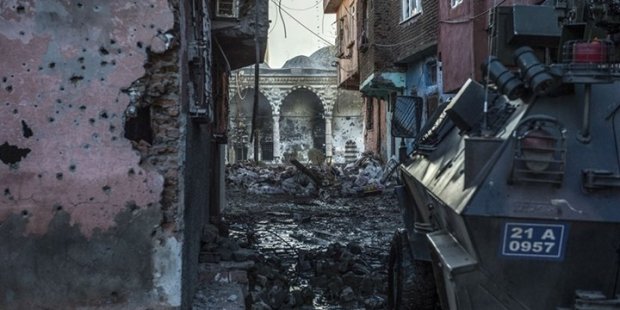


![Photo By James Gordon [CC-BY-2.0 (http://creativecommons.org/licenses/by/2.0)], via Wikimedia Commons](http://occupyworldwrites.org/wp-content/uploads/2014/08/Kurdish_flag_photo-214x300.jpg)
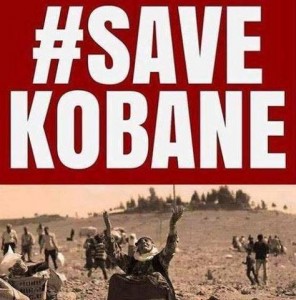
![Flag of the YPG. By LibComInt (Own work) [CC-BY-SA-4.0], via Wikimedia Commons](http://occupyworldwrites.org/wp-content/uploads/2014/10/YPJ_Womens_Defence_Units.jpg)
